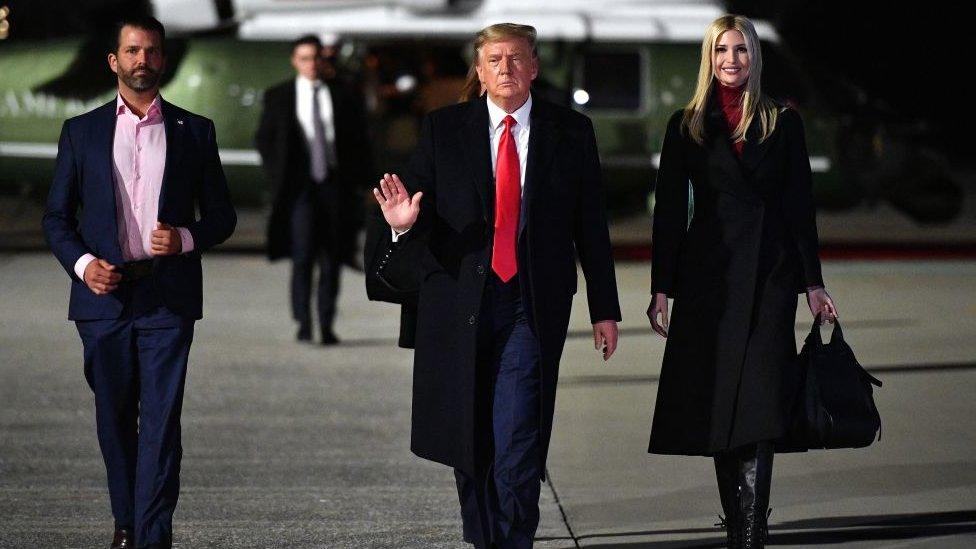Judge rules Donald Trump must testify in New York investigation
- Published

A judge has ruled that Donald Trump and two of his children must testify in a New York investigation
Former US President Donald Trump and two of his children must answer questions under oath in a New York investigation into their business practices, a judge has ruled.
New York's attorney general has accused the Trump Organization of obtaining tax breaks and loans through "fraudulent or misleading asset valuations".
Mr Trump must sit for sworn testimony within 21 days.
He denies the accusations, and is expected to appeal the decision.
He could also invoke his right to remain silent in any deposition.
The Trump Organization said in a statement to the BBC: "The entire system is corrupt."
On Thursday, New York Supreme Court Judge Arthur Engoron said that Mr Trump, his son Donald Trump Jr, 44, and daughter Ivanka Trump, 40, must each comply with legal orders that prosecutors issued in December.
New York Attorney General Letitia James' investigation had uncovered "copious evidence of possible financial fraud", the judge said, giving her a "clear right" to question under oath the former president and two of his children involved in the business.
Mr Trump, 75, has called the investigation politically motivated and a "witch-hunt" by Ms James, a Democrat.

A rough day

Whether Donald Trump will actually answer questions under oath about his business practices is an open question.
An appeal is almost certainly forthcoming. And if that is unsuccessful, Mr Trump may decline to answer the questions, as his son Eric Trump did under similar circumstances in 2020.
That's what the former president's lawyers are already recommending. Having their client sit for what would surely be a multi-hour grilling by New York lawyers looking for verbal missteps or contradictory assertions is not their idea of sound legal strategy.
This is far from the end of the line, but it still was a rough day for the former president. This civil case, and the criminal probe in Manhattan, aren't going away anytime soon. And having a judge, in a written order, say that there is "copious evidence of fraud" isn't a good look - particularly for a man who likes to boast of his unparalleled business acumen.

The investigation, which was opened in 2019, aims to prove the government's claims that Mr Trump inflated the value of his assets to banks when seeking loans. The fraud is alleged to have taken place before he took office.
Attorneys for Mr Trump had attempted to sue Ms James in a bid to prevent her from questioning the former president and his children.
Ms James hailed the judge's decision as a victory, saying that "justice has prevailed".
The civil case is separate to a Manhattan criminal investigation into the Trump Organization's practices.
In court, attorneys for Mr Trump argued that testifying in the civil case would improperly allow the state to circumvent a law that bars prosecutors from calling someone to testify before a criminal grand jury unless they are granted immunity.
"If she [Ms James] wants sworn testimony from my client, he's entitled to immunity," Mr Trump's defence attorney, Ronald Fischetti said.
"He gets immunity for what he says, or he gets nothing."